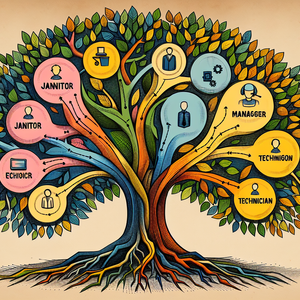Hidden Heroes in the Classroom

Support staff are the backbone of any school. From custodians who ensure a clean and safe environment to cafeteria workers who provide nutritious meals, each role is vital. For instance, imagine a school without its custodians—cluttered classrooms, unsanitary lunch areas, and a general atmosphere of neglect would prevail. Custodians, often working during the early morning or late evening hours, take on the responsibility of maintaining the cleanliness of classrooms and common areas. Their contribution is not merely physical; it also fosters a sense of pride and respect among students.
Creating a Positive Learning Environment
The influence of support staff extends beyond their immediate responsibilities. Custodians, for example, often interact with students as they clean classrooms and hallways. Their friendly greetings and smiles can uplift students’ spirits, providing a sense of belonging. Research shows that positive relationships with all school staff contribute significantly to students’ emotional well-being, which is crucial for effective learning.
Building Relationships with Students
Support staff often have unique opportunities to connect with students in ways that teachers may not. They are present in everyday scenarios—during lunch breaks, at recess, or while students wait for their rides home. These informal interactions can foster trust and rapport, helping to create a safe space for students to share their thoughts and feelings.
Challenges Faced by Support Staff
Despite their essential roles, support staff often face challenges such as low wages, lack of recognition, and limited resources. Many custodians and cafeteria workers work long hours for minimal pay, yet their contributions are rarely acknowledged. The conditions under which they operate can also be tough—custodians may need to deal with hazardous waste, while cafeteria workers often navigate tight budgets to provide nutritious meals.
Stories of Impact
Consider the story of Maria, a custodian who has worked at Lincoln High School for over a decade. Maria makes it a point to learn the names of students and shares encouraging words with them daily. Many students credit her kindness for helping them feel seen and valued in a large school setting. Her small acts of kindness go a long way in creating a welcoming atmosphere.
As we continue to celebrate the pivotal role of teachers in education, it is equally important to recognize the hidden heroes who contribute to the overall success of our schools. Custodians, cafeteria workers, and administrative assistants play crucial roles in creating a positive and enriching learning environment for students. By shining a light on their stories and contributions, we not only honor their work but also foster a deeper appreciation for the collaborative nature of education.
School Custodian
Public and private school districts, charter schools, and educational institutions.
Core Responsibilities
Maintain cleanliness and hygiene in classrooms, restrooms, and common areas.
Perform routine maintenance tasks, including minor repairs and emergency clean-ups.
Ensure that safety protocols are followed, particularly in hazardous situations.
Required Skills
Strong attention to detail and time management skills.
Ability to operate cleaning equipment and handle cleaning chemicals safely.
Good communication skills for interacting with staff and students.
Cafeteria Worker
School districts, private schools, and food service companies that cater to educational institutions.
Core Responsibilities
Prepare and serve nutritious meals while adhering to dietary guidelines.
Maintain a clean and organized kitchen and dining area.
Engage with students during meal times to promote a positive dining experience.
Required Skills
Knowledge of food safety and sanitation practices.
Strong interpersonal skills to interact with students and staff effectively.
Ability to work in a fast-paced environment and manage multiple tasks simultaneously.
School Administrative Assistant
K-12 schools, charter schools, and educational organizations.
Core Responsibilities
Manage school communication, including phone calls, emails, and visitor inquiries.
Assist in maintaining student records and scheduling appointments.
Support teachers and staff with administrative tasks and event planning.
Required Skills
Proficiency in office software and strong organizational skills.
Excellent verbal and written communication abilities.
Ability to maintain confidentiality and handle sensitive information.
Special Education Paraprofessional
Public and private schools with special education programs, inclusive classrooms, and support services.
Core Responsibilities
Assist special education teachers in implementing individualized education plans (IEPs).
Provide support to students with disabilities during classroom activities and transitions.
Help with behavioral management and social skills development.
Required Skills
Empathy and patience to work effectively with diverse student needs.
Understanding of special education laws and practices.
Ability to collaborate with teachers, therapists, and parents.
School Counselor
K-12 schools, community colleges, and educational nonprofits.
Core Responsibilities
Provide academic, career, and personal counseling to students.
Develop programs and workshops to promote social-emotional learning.
Collaborate with teachers, parents, and administrators to support student well-being.
Required Skills
Strong interpersonal and communication skills to build rapport with students.
Knowledge of mental health resources and crisis intervention strategies.
Master’s degree in counseling or a related field, along with state licensure.


